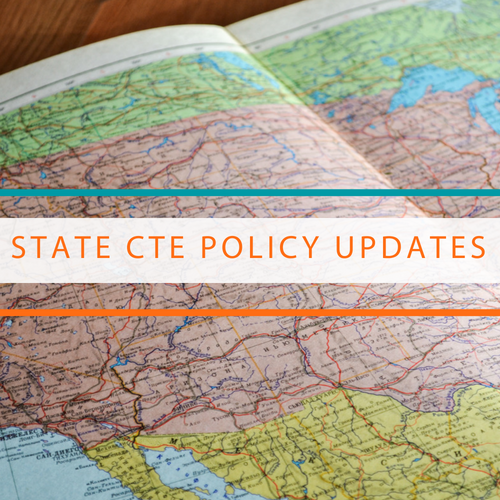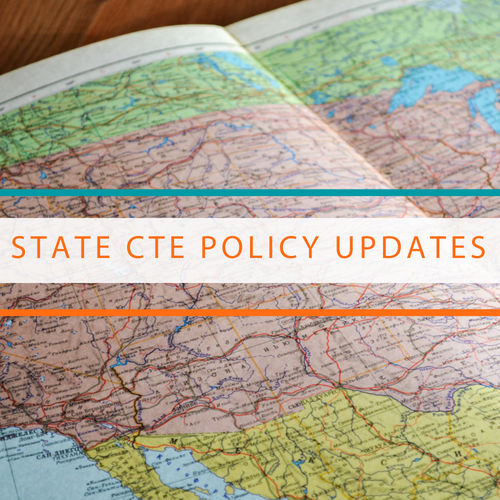 State education agencies, legislators and educators faced significant challenges from the coronavirus pandemic, including adapting to remote and hybrid delivery of hands-on learning, and responding to local and national skilled labor shortages. The number of state-level CTE policies enacted that affect Career Technical Education (CTE) fell to the lowest number in 2020 since Advance CTE and the Association for Career and Technical Education (ACTE) began publishing these annual Year in Review reports.
State education agencies, legislators and educators faced significant challenges from the coronavirus pandemic, including adapting to remote and hybrid delivery of hands-on learning, and responding to local and national skilled labor shortages. The number of state-level CTE policies enacted that affect Career Technical Education (CTE) fell to the lowest number in 2020 since Advance CTE and the Association for Career and Technical Education (ACTE) began publishing these annual Year in Review reports.
However, with a new commitment to upskilling and reskilling American learners and a CTE without limits, 41 states enacted 138 policies impacting CTE and career readiness in 2021. Advance CTE and ACTE have witnessed the return of pre-pandemic numbers in state policy actions in 2021 with policies affecting the secondary, postsecondary, adult and/or workforce systems, and including legislation, executive orders, and budget provisions that significantly changed funding.
Each year, Advance CTE and ACTE publish a yearly state policy tracker and categorize each state policy action by topic. In 2021, the top five topics that state policy most frequently addressed were:
- Funding;
- Access and equity;
- Data, reporting and/or accountability;
- Industry partnerships and work-based learning; and
- Industry-recognized credentials.
Funding
Policies that address significant changes in CTE funding, such as increasing or decreasing allocations, creating a scholarship or grant program, or investing in a pilot program have been categorized by this topic. Twenty-four states enacted 51 policies in 2021 that affected CTE funding, making funding the most common policy category for the ninth year in a row. Below are a few state policy actions from this category:
- Colorado created an energy sector career pathway and established the Strengthening Photovoltaic and Renewable Careers (SPARC) Workforce Development Program. The goal of this program is to create capacity for training, apprenticeship and education programs in the energy career pathway, with a goal of increasing employment in this sector.
- Delaware established and expanded multiple statewide scholarship programs, including the Focus on Alternative Skills Training (FAST) Program and the Elevate Delaware program. These programs provide up to $10,000 each to eligible Delaware residents toward tuition for non-degree credential programs that provide industry-recognized skill training and certification.
- Kansas established the Kansas Promise Scholarship Program, administered by the Kansas State Board of Regents. The program serves as a last-dollar scholarship to assist learners with financial barriers that may prevent them from completing a two-year associate degree program or CTE certificate program aligned to in-demand careers and credentials.
State Policies Impacting CTE: 2021 Year in Review marks the ninth annual review of CTE and career readiness policies from across the United States conducted by Advance CTE and ACTE. This report does not describe every policy enacted within each state but instead focuses on national policy trends.
View the full report and 2021 state policy tracker here.
Dan Hinderliter, Senior Policy Associate


 State education agencies, legislators and educators faced significant challenges from
State education agencies, legislators and educators faced significant challenges from  Hello! My name is
Hello! My name is  Advance CTE welcomes Dr. Tunisha Hobson as State Policy Manager. Dr. Hobson will support t
Advance CTE welcomes Dr. Tunisha Hobson as State Policy Manager. Dr. Hobson will support t Meet Christina Koch! Christina serves in the role of Policy Associate for Advance CTE. Christina works on projects related to state policy, including the New Skills
Meet Christina Koch! Christina serves in the role of Policy Associate for Advance CTE. Christina works on projects related to state policy, including the New Skills